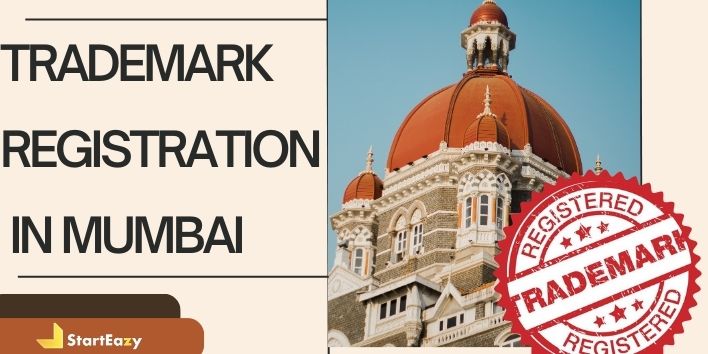Trademark Registration in Mumbai | Complete Guide

Mumbai stands tall as India's epicenter of business and finance, boasting a multitude of corporate giants and financial institutions.
It's not just Maharashtra's capital but also the heartbeat of India's commercial and financial realms, housing major corporate headquarters, banks, and stock exchanges.
The trademark registration process for businesses or startups in Mumbai, Maharashtra, is handled by the Trademark Registry office.
Maharashtra and other nearby areas fall within the jurisdiction of this office, so trademark registrations are started here.
Securing a trademark marks a key milestone in establishing your brand identity.
By initiating this process through the Mumbai Trademark Registry, you're applying a solid foundation for your brand's journey, enhancing its recognition, and safeguarding its uniqueness in the business landscape of Mumbai and beyond.
Trademark Registration Office:
Mumbai might have its own local trademark office or branch where you can file your trademark application in person.
In the context of Mumbai, India, the local trademark office would be the branch of the Trademark Registry that serves the city and its surrounding areas.
One of the key advantages of having a Local Trademark Office is accessibility and convenience.
It becomes much easier for local businesses, entrepreneurs, and trademark agents to interact with trademark officials, submit applications, attend hearings, and seek guidance on trademark matters without traveling long distances if an office is located in Mumbai.
To register a trademark for your business, you'll need the help of a trademark attorney. Having a trademark attorney can make the process much smoother since this person is an expert in trademark law.
Price of Trademark Registration in Mumbai:
The government charges a fixed fee for trademark registration.
If you're an individual, startup, or small enterprise, the fee is Rs. 4500.
However, if you don't fall into these categories, the fee doubles to Rs. 10,000.
The professional fees vary depending on the consultancy or service provider you choose.
Different consultancies may charge different amounts to assist you with the trademark registration process.
Usually, in Mumbai, the professional fee for trademark registration starts from Rs. 15,000/-. However, this amount may vary depending on the services provided by different professionals or consultancies.
These fees cover the services provided by the consultancy, such as preparing and filing the trademark application, responding to objections, and navigating the registration process.
However, if you go for an online registration process, the fees of the consultancies are different and cheaper as well.
For Example, if you register your trademark from our team, the consulting fee will cost you around Rs.6890/- ( including govt. fees).
Documents Required in Trademark:
- Sole Proprietorship, Partnership, and HUF:
- PAN Card
- Aadhaar Card
- Udhyog Aadhaar( MSME Registration)
- Signed form TM-48
- Company, LLP, Society, Trust, Others
- Registration certificate of Firm or Company
- PAN card of Firm or Company
- Proof of the Office or Premises
- Declaration by Directors/Partners
- Signed form TM-48
Process and Time Duration of Trademark Registration in Mumbai:
A. Processing before Examination:
- You can apply for your trademark online or offline.
- If your trademark includes any images or designs, they will be encoded according to international standards to guarantee consistency and clarity.
- Applications are handled in the order they come in, with priority for the earliest filings.
B. Examination of Applications:
- A trademark expert checks your application to make sure it follows all the rules.
- If there are issues, you'll get a chance to fix them.
- Once everything's good, your trademark will be shown in the official journal.
- If there are problems, you'll get a report and a month to respond.
C. Processing after Examination:
- You have to reply to any objections within a month otherwise, you could lose your application.
- Replies are sorted based on when you filed your application.
- If issues continue, there might be a hearing to talk things over.
D. Processing after Advertisement:
- If nobody opposes your trademark within 4 months of its announcement, it can be registered.
- If there's no opposition, you'll automatically get a certificate confirming your trademark.
E. Opposition:
- If someone disagrees with your trademark, both sides can chat about it.
- If their arguments don't hold up, your trademark can still get registered.
F. Management after Registration:
- Once your trademark is registered, you can update details like your address.
- Updates are handled based on when you submitted them.
- Renewals are sorted by filing date to keep things organized.
After you get your trademark certificate, you can proudly use the ® symbol next to your logo or brand name.
Remember, getting a trademark takes time around 18-24 months on average, but you'll usually get an application number within a couple of days.
Notaries in Mumbai:
Notaries are government-approved experts who verify and validate legal documents and deals. You can find them both online and offline.
For Online, you can look on sites like Justdial, Sulekha, or Yellow Pages.
For Offline, you can simply Google "Notaries in Mumbai." There are public notary offices or chambers where they work. These places might be standalone offices or part of bigger legal centers.
When you visit a notary, they'll help you with a stamp duty of Rs.100/- for an authorization letter. Make sure to go to a notary who knows what they're doing.
Trademark Registration Online vs Offline:
Let's break down the differences between trademark registration offline and online in a simple way:
Process:
Offline-
You physically visit the trademark office or a designated center to submit your application and documents.
Online-
You complete the entire registration process electronically through a dedicated website or online portal.
Online registration is convenient, accessible from anywhere with an internet connection, and often faster than offline methods.
Documentation:
Offline-
You need to fill out physical forms and provide hard copies of the required documents.
It can be time-consuming and may involve travel to the trademark office. Processing times may also vary.
Online-
With online trademark registration, you complete digital forms and upload electronic copies of your documents. It's less hectic and saves time since you don't need to visit any office.
Accessibility:
Offline-
This service is only available at specific government offices or notaries' public locations, which may not be easily accessible to everyone.
Online-
Trademark registration is easily accessible to anyone with an internet connection, making it convenient for people from any location to apply for trademark registration.
Status Tracking:
Offline-
Limited ability to track the status of your application, often requiring follow-up visits or calls to government offices.
Online-
Provides real-time tracking of application status through online portals, allowing applicants to monitor progress and receive updates conveniently.
Cost:
Offline-
The offline mode may involve additional costs such as travel expenses to government offices or notary fees.
Online-
Generally more cost-effective as it eliminates the need for travel and physical documentation, reducing overall expenses.
3-4 days
- You can apply for your trademark either online or offline.
- If your trademark has images or designs, they'll be encoded to ensure they're clear and consistent.
- Applications are processed in the order they're received, with priority given to the earliest filings.
Once your application for trademark registration has been accepted by the government, it will be publicly announced for a period of 4 months. This period is known as the opposition period, during which anyone who believes they may be affected by the registration of the trademark can file an objection.
If no opposition is raised within the 4-month period, your trademark will be considered accepted, and your application will proceed to registration. You will be issued a certificate of trademark registration, which is a legal document that gives you the exclusive right to use the trademark in the relevant market.
However, if any objections are raised, the process will be delayed, and it may take up to 6 to 8 months for the government to decide whether to accept or reject your application. During this time, you may be required to provide additional evidence or arguments to support your application.
In any case, it is important to ensure that your trademark application is properly prepared and filed, with the assistance of a qualified legal professional if necessary, to increase the chances of a smooth and successful registration process.ace.
If a member of the general public expresses opposition to your trademark application, a similar objection process to that used by the government will be initiated. You will receive an email outlining the specific reasons for the opposition, as well as the deadline for submitting your response.
If someone disagrees with your trademark, both parties will have the opportunity to discuss the matter and provide evidence to support their respective positions. The discussion will be based on the merits of the case and can include relevant legal arguments and evidence from both sides.
If, after reviewing all the evidence, the trademark office finds that the opposing arguments are not valid, your trademark can still be registered. However, if the trademark office finds that the opposing arguments have merit, your application may be refused or you may be asked to amend your application to address the concerns raised by the opposing party.
Please find below the rewritten text with corrected spelling, grammar, and punctuation errors:
Process:
Offline:
The offline process of trademark registration can be more hectic and confusing, as you have to find the right expert who can help you with the submission process. This can be even more difficult for someone who doesn't have much knowledge about the process.
Online:
On the other hand, the online method is more straightforward. You simply have to fill out the form, and an expert will directly coordinate with you for the process of filling of trademark registration. Online registration is like having your personal registration assistant – it's convenient, accessible from anywhere with the internet, and often quicker than traditional methods.
Accessibility:
Offline:
In the offline way, the process of registration filing can be quite confusing, especially when it comes to knowing which documents are required and what steps need to be taken in case of opposition or objection.
Accessibility in the offline process is lower than doing the process online.
Online:
Trademark registration online is like having the whole process at your fingertips. From filling to certification, each step can be done without confusion. Additionally, in case of application objection or opposition, you can get help in submitting your answer by expert guidance.
Status Tracking:
Offline:
In the offline method, you have to contact the trademark attorney for every step, and sometimes, you may have to visit their office as well.
Online:
With online registration, it's like having a tracking app for your package. You can check your application status anytime, anywhere, without the hassle of making extra trips.
The baking industry is a crucial part of the food industry, providing delicious treats that bring joy to people's lives. Future Market Insights predicts that the global bakery products market size in India will exceed $7.5 billion by 2022, which is a testament to the industry's potential for growth and success. If you're considering opening a bakery, this is an exciting time to do so, and you have the opportunity to bring happiness to countless people through your baked goods. One of the first decisions you'll need to make is whether you want to create a retail bakery or a wholesale bakery, but either way, you can make a positive impact on people's lives through the power of baking.









